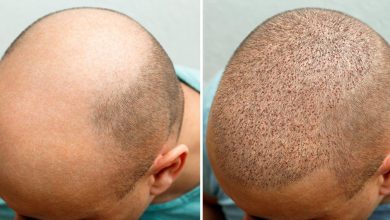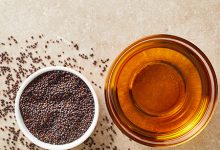Casey Halpern Uses Science and Surgery to Address Mental Health—Starting with Cravings

Suppose again to listening to a favourite tune, seeing an outdated good friend or consuming a favourite meal. When we’ve these optimistic experiences, the mind releases a chemical referred to as dopamine. Typically, after we’re hungry, we wish to have that favourite meal as a result of we all know it’ll be good. That’s regular. We additionally know there may be an excessive amount of of an excellent factor. And we all know when to cease…more often than not.

In some individuals, the a part of the mind that regulates dopamine is dysregulated. Consider it like a site visitors sign that’s caught on yellow and might’t flip purple when it ought to. This pursuit of the feel-good sensation results in craving, after which, when the site visitors sign is damaged, it results in compulsion.
That is the case with individuals affected by binge consuming dysfunction. This psychological well being sickness is most typical consuming dysfunction and is related to individuals incessantly shedding management over their consuming. However it’s not starvation that drives them; it’s the craving. And, much like different compulsions, they will’t cease.
A Penn Medication research made national headlines just lately, exhibiting early promise that what the mind can’t self-regulate in lack of management whereas consuming, sensible deep mind stimulation (DBS) can.
“The DBS is sensible,” mentioned Casey Halpern, MD, an affiliate professor of Neurosurgery on the Perelman Faculty of Medication and director of Stereotactic and Useful Neurosurgery at Pennsylvania Hospital. “It senses the craving and upcoming lack of management after which delivers the stimulation at these most weak occasions.”
The research, led by Halpern, has proven that this sensible DBS method is perhaps the important thing to unlocking the obsessed mind and restoring the cease sign that sufferers want.
How Halpern Started to Research Cravings within the Mind
All through highschool and faculty, Halpern had a rising curiosity within the mind. In consequence, his unplanned assembly with neurologist Murray Grossman, MD, on the College of Pennsylvania campus as a first-year scholar was serendipitous. Grossman, who had been Halpern’s soccer coach in highschool, is director of the Penn FTD (frontotemporal dementia) Heart. Once they met on Locust Stroll that day, he requested Halpern if he’d love to do analysis in his lab, which targeted on neurologic issues akin to Alzheimer’s and Parkinson’s illness.
Halpern jumped on the alternative and all through his Penn schooling—as an undergrad, a scholar on the Perelman Faculty of Medication after which as a neurosurgical resident on the Hospital of the College of Pennsylvania — his work within the lab and Grossman’s mentorship helped him zero in on his future profession.
His determination to concentrate on image-guided neurosurgery stems from the primary deep mind stimulation (DBS) he noticed, which eradicated the tremors in a affected person with Parkinson’s illness. In DBS — which Halpern describes to a “pacemaker for the mind” — electrodes are implanted in particular areas of the mind the place the uncontrolled habits is situated. On this case, the electrodes disrupted the tremor-related sign. As neurosurgeon Gordon Baltuch, MD, carried out the process, Halpern watched the stimulator activate and the tremor “simply disappeared” as he recalled.

“The affected person did so nicely I by no means wished to do anything,” Halpern mentioned, including that Baltuch went on to grow to be his mentor, as nicely.
Halpern knew early on that he wished to use DBS to ailments past Parkinson’s and different neurologic issues. Weight problems and associated issues turned his focus. He mentioned considered one of his mentors, Alan Rosenquist, PhD, now an emeritus professor of Neuroscience, suggested him to broaden his analysis to take a look at the reward mechanisms of weight problems, not simply weight problems. “In case you do this,” he informed Halpern, “you’ll not solely assist sufferers with weight problems but in addition individuals with habit and different psychiatric issues.”
“I made a decision to spend the remainder of my profession on the lookout for craving cells,” Halpern recalled.
Transferring Towards to FDA Approval for a Medical Research
There wasn’t but sufficient preclinical proof to justify doing these sorts of research in human trials again in 2007. Nevertheless, Halpern found a analysis lab on the Penn campus, led by Tracy Bale, PhD, previously at Penn, that was utilizing mouse fashions to check binge consuming habits and reached out to work along with her.
The mouse research confirmed that DBS might cease the bingeing introduced on by cravings however extra necessary, it confirmed the particular a part of the mouse’s mind that managed them: the nucleus accumbens, one of many principal areas of the mind that receives dopamine.
“The nucleus accumbens is considered one of or the one area within the human mind that shares robust evolutionary improvement with the mouse mind,” Halpern mentioned. “Each different a part of the human mind has developed in another way. We focused a construction we might increase to a human.”
After finishing his residency in 2014, Halpern continued his mouse research at Stanford College. 5 years later, based mostly on the info collected from the mouse research in addition to in-depth imaging research on people, Halpern acquired FDA approval to proceed with the primary medical trial on people utilizing DBS to regulate lack of management consuming. The surgical procedure passed off at the beginning of 2020. Each research contributors had suffered with this binge consuming dysfunction for a lot of their lives and every had undergone gastric bypass surgical procedure however, sadly, had regained most, if not all, of the load.
To induce cravings through the surgical procedure — through which the sufferers have been awake — every was proven an image exhibiting a meals they might sometimes binge on. When the sufferers noticed the image of the meals, “we had on the spot outcomes,” Halpern mentioned.
The implanted electrodes sensed alerts that predicted a binge; impartial footage obtained no response. The electrodes then stimulated the lit-up areas within the nucleus accumbens, disrupting the craving-related alerts. “That gave us the arrogance that we have been within the a part of the mind we wished to modulate…and that led to success on this early medical trial.”
Because of the surgical procedure, neither of those first two trial contributors now meets the factors for binge consuming dysfunction, after having it for greater than 20 to 30 years.
“Their relationship with meals has considerably improved,” Halpern mentioned. “They don’t binge anymore.”
Halpern, who returned to Penn in 2021, will start a second medical trial within the subsequent few months, this time with six sufferers. This trial will proceed for a couple of yr.
Increasing the Scope
Halpern is extraordinarily grateful to the various mentors who helped him all through his profession. “I actually consider in mentorships,” he careworn, and he pays this ahead in his personal labs by quite a few post-doctoral college students, grad college students, residents and medical college students.
He hopes to increase his analysis past weight problems issues, to different types of compulsive habits that happen within the nucleus accumbens. “The dysregulation of the dopamine system seen in obsessive compulsive dysfunction [OCD] and in habit additionally converge in that area of the mind.”
He’s additionally working with researchers from neurology, psychiatry and engineering to develop noninvasive methods to regulate these behaviors. They’ve been in a position to detect the identical sign predicting a craving on the scalp, which can assist develop strategies that don’t require mind surgical procedure to intervene. One such chance could also be to make use of transcranial magnetic stimulation, which has already been permitted for melancholy and OCD.
“I’m a neurosurgeon specializing in psychological well being. Neurosurgery is the reply for a few of these sufferers however not the bulk,” Halpern mentioned. “I’m going to concentrate on each.”









